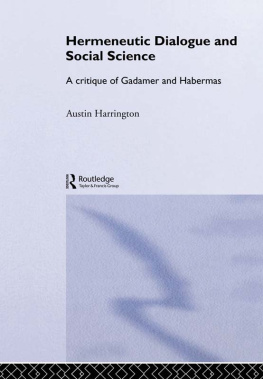First published in 1944
by Routledge
Reprinted in 1998, 1999, 2000, 2002
by Routledge
2 Park Square, Milton Park, Abingdon, Oxon, OX14 4RN
or
270 Madison Avenue, New York, NY 10016
First issued in paperback 2010
Routledge is an imprint of the Taylor & Francis Group
1944 H. A. Hodges
All rights reserved. No part of this book may be reprinted or reproduced or utilized in any form or by any electronic, mechanical, or other means, now known or hereafter invented, including photocopying and recording, or in any information storage or retrieval system, without permission in writing from the publishers.
The publishers have made every effort to contact authors/copyright holders of the works reprinted in The International Library of Sociology. This has not been possible in every case, however, and we would welcome correspondence from those individuals/companies we have been unable to trace.
British Library Cataloguing in Publication Data
A CIP catalogue record for this book
is available from the British Library
Wilhelm Dilthey: An Introduction
ISBN 978-0-415-17523-4 (hbk)
ISBN 978-0-415-60511-3 (pbk)
ISBN 978-1-136-11729-5 (ePub)
Social Theory and Methodology: 22 Volumes
ISBN 978-0-415-17818-1
The International Library of Sociology: 274 Volumes
ISBN 978-0-115-17838-9
Publishers Note
The publisher has gone to great lengths to ensure the quality of this reprint but points out that some imperfections in the original may be apparent
This is the first book on Wilhelm Dilthey to be published in England. It is overdue. This German philosopher, hardly known in this country, has been a growing influence in his own since the beginning of the present century, and his work deserves attention both for its inherent good sense and also for the freshness of his themes. For Dilthey is an innovator and a pioneer. Many of the issues which he raises were implicit in the position reached by German philosophy before his time, but it is he who has drawn them together and revealed their full extent and meaning. Philosophy in the English-speaking world has hardly trodden these paths at all, and British and American readers will find much here that is novel and challenging.
Diltheys life was uneventful. Born in 1833 at Biebrich am Rhein, near Mainz, the son of a pastor of the Reformed Church, he intended at first to follow the same vocation, but, like so many of the great German philosophers, found while a student that his real bent lay elsewhere. He obtained his Doctorate at Berlin in 1864, and in 1867 became Professor of Philosophy at Basel, where for a year he was a colleague of Jakob Burckhardt Then he moved to Kiel (1868), then to Breslau (1871), and finally in 1882 to Berlin, where he remained until his death in 1911. His mind matured slowly. The trend of his interests and purposes was manifest from the start, and the main lines of what was to be his great work, his Critique of Historical Reason, were established as early as 1880 ; but the execution was attended by so many delays and side-excursions that death overtook him with the great work still unfinished, though ample material had been accumulated, which has been arranged and published by his literary executors. Through a literary veil in some wavs uninviting it is possible to discern a philosophy of real originality depth, and power.
It is a critical philosophy in the Kantian sense, i.e. a philosophy devoted principally to questions of epistemology and logic, the latter term being taken to cover the methodology of the sciences. In this respect it agrees with what has been a dominant tradition in Anglo-Saxon thought all through modern times, but in detail the questions which he raises are of a kind hardly faced by philosophers in the Anglo-Saxon world.
To such readers the most novel and striking thing will probably be his delicate and detailed analysis of the process of understanding (das Verstehen) whereby we come to know our own mental life and that of others. This is a side of epistemology which has been steadily neglected since the very earliest times. Philosophers have devoted endless trouble to discussing how we come to be aware of physical objects and how far subjective elements enter into our experience of them. They have talked as if our world consisted entirely of such objects, and as if the knowledge of them were our chief intellectual concern. Yet the most significant of our experiences lie in our relations with other people, and the nature and extent of the knowledge which we can have of other people is a question of equal importance with the first. Dilthey is the first philosopher in any country to tackle the question seriously and systematically, and his work has started a new movement in German thought.








